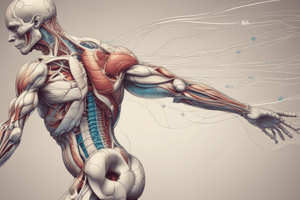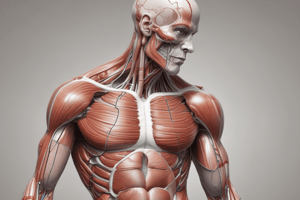Podcast
Questions and Answers
What is the name of the unit in human anatomy represented by the Sarcomere?
What is the name of the unit in human anatomy represented by the Sarcomere?
Muscle fiber
Which structure is responsible for storing calcium ions in muscle cells?
Which structure is responsible for storing calcium ions in muscle cells?
- Sarcoplasmic reticulum (correct)
- Mitochondrion
- Sarcolemma
- T-tubule
The Neuromuscular junction is the point where a muscle fiber and a neuron meet.
The Neuromuscular junction is the point where a muscle fiber and a neuron meet.
True (A)
The __________ is the outer membrane of a muscle cell.
The __________ is the outer membrane of a muscle cell.
Match the following skin types with their descriptions:
Match the following skin types with their descriptions:
What is the name of the structure that produces sweat in the skin?
What is the name of the structure that produces sweat in the skin?
Which part of the hair is responsible for producing oil to keep the hair moisturized?
Which part of the hair is responsible for producing oil to keep the hair moisturized?
Flashcards are hidden until you start studying
Study Notes
Muscle Structure
- A sarcomere is a functional unit of muscle tissue, composed of myofibrils, I bands, and A bands.
- Myofibrils are made up of myofilaments, which contain actin and myosin proteins.
- The sarcolemma is the plasma membrane of a muscle fiber, and it surrounds the sarcoplasmic reticulum, which stores and releases calcium ions to regulate muscle contraction.
- T-tubules are invaginations of the sarcolemma that allow for rapid transmission of action potentials.
- Mitochondria are found within muscle fibers and provide energy for muscle contraction.
Neuromuscular Junction
- The neuromuscular junction is the site where a motor neuron terminates and forms a synapse with a muscle fiber.
- The endomysium is a layer of connective tissue that surrounds individual muscle fibers.
Sweat Glands
- Apocrine and eccrine sweat glands are two types of sweat glands found in the skin.
- Apocrine glands are larger and more complex, while eccrine glands are smaller and more numerous.
Integumentary System
- The epidermis is the outermost layer of the skin, composed of stratified squamous epithelium.
- The dermis is the layer beneath the epidermis, composed of connective tissue.
- The hypodermis is the layer beneath the dermis, composed of subcutaneous tissue.
- Thin skin is found in areas such as the axilla, while thick skin is found in areas such as the palms and soles.
- The stratum corneum is the outermost layer of the epidermis, composed of dead keratinized cells.
- The stratum lucidum is a layer of the epidermis found in thick skin, composed of dead keratinized cells.
- The stratum granulosum is a layer of the epidermis composed of keratinocytes that are in the process of differentiating.
- The stratum spinosum is a layer of the epidermis composed of keratinocytes that are attached to each other through desmosomes.
Hair Structure
- A hair shaft is the visible part of the hair, while the hair root is the part of the hair that is embedded in the skin.
- The medulla is the innermost layer of the hair shaft, while the cortex is the middle layer.
- The hair bulb is the part of the hair root that is surrounded by the hair follicle.
- The hair papilla is a cluster of blood vessels that supplies the hair follicle with oxygen and nutrients.
Bone Structure
- An osteon is a functional unit of compact bone, composed of concentric lamellae and a central canal.
- The central canal contains blood vessels that supply the bone with oxygen and nutrients.
- Interstitial lamellae are layers of bone tissue that are found between osteons.
- Lacunae are small spaces within the bone tissue that contain osteocytes.
- Canaliculi are small channels that connect lacunae to the central canal.
Studying That Suits You
Use AI to generate personalized quizzes and flashcards to suit your learning preferences.




